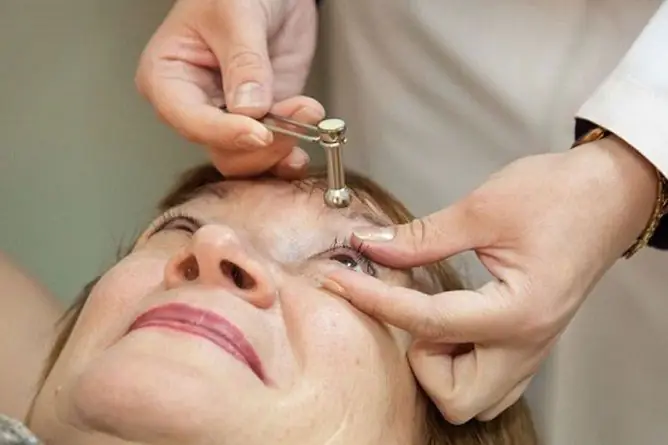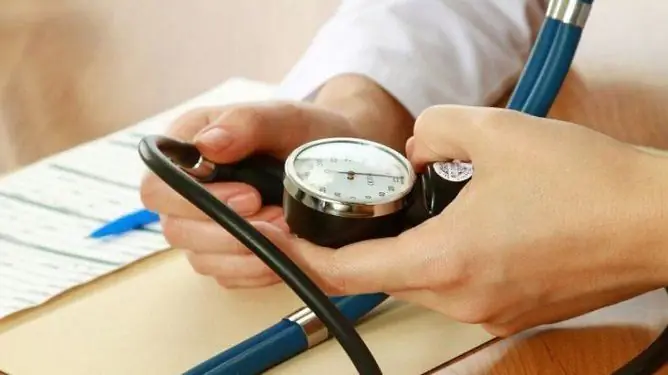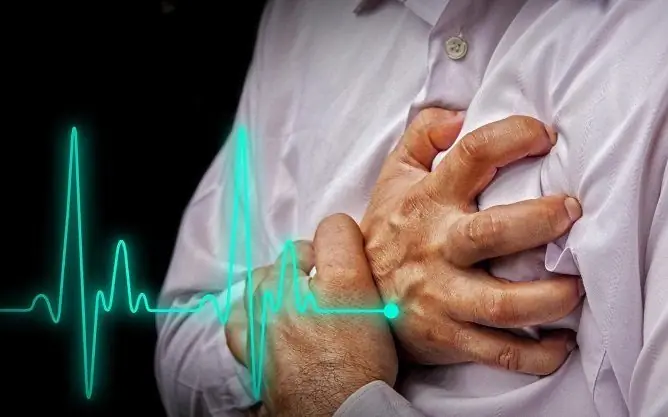- Author Rachel Wainwright wainwright@abchealthonline.com.
- Public 2023-12-15 07:39.
- Last modified 2025-11-02 20:14.
How to lower your heart rate at normal blood pressure at home
The content of the article:
- When the pulse is considered fast - normal indicators
- Reasons for an increase in heart rate at normal pressure
- How to lower your heart rate at normal blood pressure at home
- Pharmacological treatment of pathologically frequent pulse
- Video
It is necessary to reduce the pulse at normal pressure in cases where tachycardia persists for a long time and is accompanied by malaise.
High blood pressure is not the only sign of cardiovascular disease. Pathology can also be expressed by other symptoms, which are due to functional insufficiency of the affected organs, its manifestations differ for each of the systems. A frequent sign of heart disease is a constantly elevated pulse. The heart can beat faster and for physiological reasons, but if the rapid pulse is not associated with them, if it is noted constantly, you should seek medical help.

The pulse reflects the heart rate, its increase can be physiological and pathological
When the pulse is considered fast - normal indicators
In order to provide every cell of the body with nutrients and oxygen, the normal functioning of the cardiovascular system, which is represented by the central organ in the form of the heart, as well as a complex system of blood vessels, is necessary. The heart generates impulses and contracts, pushing blood, while the vessels, due to the elastic wall, absorb its contractions, stretching and narrowing, conducting the pulse wave further and further. This is how a pulse is formed, which directly depends on the heart rate (HR). The faster the heartbeat, the higher the heart rate.
In this case, blood pressure may not change, since it largely depends on the state of the vessels. Thus, quite often a picture is observed in which it is necessary to reduce the pulse at normal pressure.
When is it advisable? The pulse on both hands should be even, equally frequent, between beats the pause should be the same length. The normal frequency of contractions averages 60-70 beats per minute for an adult, although it may deviate slightly (for example, athletes have a low heart rate, which is not a deviation). In a child, the indicator of the norm is much higher, his heart beats faster - the pulse of children under 3 years old can reach 90-110 beats per minute, for 3-8 years old, the characteristic indicator will be 80-90 beats, and for adolescents, the norm practically coincides with that of an adult, sometimes increasing up to 80-85 cuts.
If the heartbeat is rapid, this condition is called tachycardia, but if the heart rate is lowered, they speak of bradycardia. Both conditions can have both physiological and pathological causes. Tachycardia can be caused by damage to the heart muscle or a compensatory reaction to a change in homeostasis, bradycardia - by circulatory failure.
Reasons for an increase in heart rate at normal pressure
Not always a high pulse is a sign of a disease, especially when it is not associated with an increase in blood pressure.
There may be several reasons, more often these are the body's normal responses to the following situations:
- Stress is an increased emotional load that lasts for a short period of time, causes the activation of the sympathoadrenal system, which is accompanied by the release of large amounts of adrenaline into the blood. This highly active hormone increases vascular tone, constricts them, and also increases heart rate, causing the heart to beat quickly - everyone knows this stressful effect. If stress lasts for a long time, glucocorticoids are produced, which cause persistent tachycardia.
- Physical activity. When doing physical work, the musculature's need for nutrients increases, so the heart muscle begins to contract much faster. At the same time, the oxygen demand of the myocardium itself also increases, which is fraught with heart attack or angina pectoris.
- Overheating. In a hot room, the heart rate will be significantly higher than in a cool one. The same is observed with an increase in body temperature in diseases.
- Overeating. The large amounts of fluids and proteins obtained during the meal change the properties of the blood, and the heart beats harder and faster to pump it.
- Pregnancy. During pregnancy, the mother's body provides the fetus with full blood flow, so the heart is forced to beat faster than usual, sometimes this leads to myocardial hypertrophy.
There are also less harmless causes of tachycardia, these include:
- Disorders in the work of the endocrine glands. Many hormones affect the heartbeat, often the cause of tachycardia is overproduction of thyroid hormones. They produce an activating effect, speed up metabolism.
- Anemia. Tachycardia is a frequent manifestation of this pathology, it can be used to recognize a patient with low hemoglobin and erythrocytes. This is because when the oxygen content in the blood is low, it must be pumped more often.
- Tachycardia after alcohol - the heartbeat increases with the consumption of small doses of alcohol, but decreases with the use of high doses due to inhibition of the vasomotor center in the brain.
- Poisoning. One of the effects of foodborne toxicity is an increase in heart rate against the background of no pressure and a reduced heart rate. This promotes faster elimination of the toxin, but may be accompanied by increased urine output and dehydration.
- The action of pharmacological drugs. Many drugs can cause side effects in the form of an increase in heart rate, cardiotonics (glycoside - Digoxin, non-glycoside - Dobutamine), adrenomimetics (Mezaton, Salbutamol), sympatholytics, some diuretics that disrupt the water-salt balance, causing tachycardia and rhythm disturbances have such an effect.
How to lower your heart rate at normal blood pressure at home
You should not take the pills immediately, as soon as an increased pulse is detected, you first need to determine the cause and try to eliminate it by resorting to lifestyle correction. If the tachycardia is not caused by a serious pathology, you can start with folk remedies (always after consulting your doctor).
List of herbs with sedative effects:
- Rosehip - a decoction of this plant lowers the pulse both at elevated and normal pressure, has a diuretic effect, it has a high content of vitamin C, so it strengthens the immune system and invigorates. It is simple to prepare the broth - a tablespoon of dry or fresh fruits is poured with a mug of boiling water and adjusted for an hour and a half, after which the drink is ready for use.
- Hawthorn - you can prepare a decoction from it in the same way as in the case of rose hips, but you can also make an alcoholic tincture - for this, a small jar filled with berries is poured with vodka and infused in a dark, cool place for a week. After that, filter the liquid, and then take a few drops after meals (2-3 times a day).
- Peppermint and lemon balm are classic sedatives that can be used as a tea. The addition of lemon enhances the effect.
- Motherwort - it can be used both in the form of a pharmacy tincture and prepare a decoction at home. To prepare the broth, a tablespoon of dry herb is poured with a glass of cold water, brought to a boil and simmered for 5 minutes, after which it is allowed to cool. Strain and drink 1/3 cup 3 times a day.

Rosehip decoction is a good home remedy for heart rate normalization
What to do to prevent the pulse from rising to pathological levels? It is necessary not to overload with physical work, relax more often, take a cool or contrast shower, be in the fresh air every day.
Pharmacological treatment of pathologically frequent pulse
How to lower the heart rate at normal pressure if traditional methods do not help? Then you need to take the drugs prescribed by your doctor. For the most part, they affect pressure too, so they need to be carefully monitored.
What pills are commonly used for these purposes? The choice is up to the doctor, but most often these are drugs of two groups:
- beta-blockers - affect receptors right in the heart, reducing the strength and frequency of contractions. When the dose is increased, the pressure is effectively reduced. Side effects are possible with non-selective drugs such as Atenolol - it causes bronchospasm. Modern means of this group: Bisoprolol, Nebivolol, Metoprolol;
- calcium channel blockers - muscle contraction occurs due to the transport of calcium into the cells of muscle fibers. The drugs of this group block the channels through which ion exchange occurs. Thus, the heart rate and strength of the heart is reduced. Popular drugs in this group are Nifedipine, Verapamil, Diltiazem.
Video
We offer for viewing a video on the topic of the article.

Nikita Gaidukov About the author
Education: 4th year student of the Faculty of Medicine No. 1, specializing in General Medicine, Vinnitsa National Medical University. N. I. Pirogov.
Work experience: Nurse of the cardiology department of the Tyachiv Regional Hospital No. 1, geneticist / molecular biologist in the Polymerase Chain Reaction Laboratory at VNMU named after N. I. Pirogov.
Found a mistake in the text? Select it and press Ctrl + Enter.






